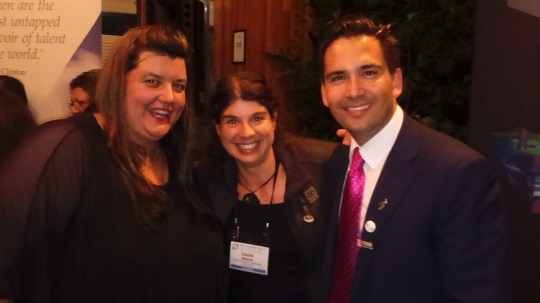World Geothermal Congress 2015
SGEES PhD student Cécile Massiot represented Victoria University of Wellington at the World Geothermal Congress last week in Melbourne.

SGEES PhD student Cécile Massiot represented Victoria University of Wellington at the World Geothermal Congress last week in Melbourne.
Co-organised by Australia and New Zealand, the congress is a 5-yearly gathering of the geothermal community, the biggest of its kind with 2000 attendees.
The President of the International Geothermal Association Juliet Newson, a New Zealander, opened the conference together with the New Zealand’s Energy and Resources Minister Hon Simon Bridges.
With the 2015 theme “Views from Down Under – Geothermal in Perspective”, attendees were encouraged to share geothermal developments from each country.
“New Zealand is en-route for the 90 percent renewable electricity target for 2025, with a significant contribution to the global increase in geothermal installed capacity since the last congress, as shown by the world update presented by keynote speaker Ruggero Bertani”, says Cécile.
“New Zealand also has a big implication in geothermal training, with things like the Institute of Earth Science and Engineering at Auckland, New Zealanders teaching in Indonesia, and aid programs in Asia-Pacific.”
Cécile says there are some exciting geothermal developments occurring around the world.
“New boundaries will be pushed in the near future with projects in Iceland, Japan and the US aiming at reaching supercritical fluids. If the technological and financing challenges can be overcome, such drill holes could provide 10 times more energy than conventional ones. A similar project is planned for New Zealand but may take longer to be implemented.”
Cécile presented results from her PhD project about the fracture distribution in wells of a high temperature Geothermal field located north of Taupo.
Technical sessions offered Cécile the opportunity to sit in on a number of interesting discussions about a wide range of specialities.
“There were a number of sessions on sustainability, financing and legal frameworks, and community involvement”, says Cécile. “I discovered the spiritual consideration of Maori to the land and thermal manifestations were similar to those of Maasai and other indigenous communities in Kenya.”
Cécile says her favourite part of the conference was the ‘WINGS - Women in Geothermal’ networking event.
The group, initiated by Andy Blair from GNS Science in Taupo, promotes the education, professional development and advancement of women in the global geothermal community while raising awareness about women's issues in the workplace, including salary, leadership and recognition. Gender has been an industry issue in the past, with for example female Indonesian geologists once forbidden on drilling sites.
“Women who have made a significant impact in the geothermal community and WINGS ambassadors representing each continent were presented with pounamu by the Minister”, says Cécile.
“The group is very informal and open to all, including men. The male to female ratio was 50:50, a first for a geothermal event.”
The next World Geothermal Congress is scheduled to be held in Iceland in 2020.
Conference presentation papers are available on the IGA website.
For more information about WINGS see Facebook.
